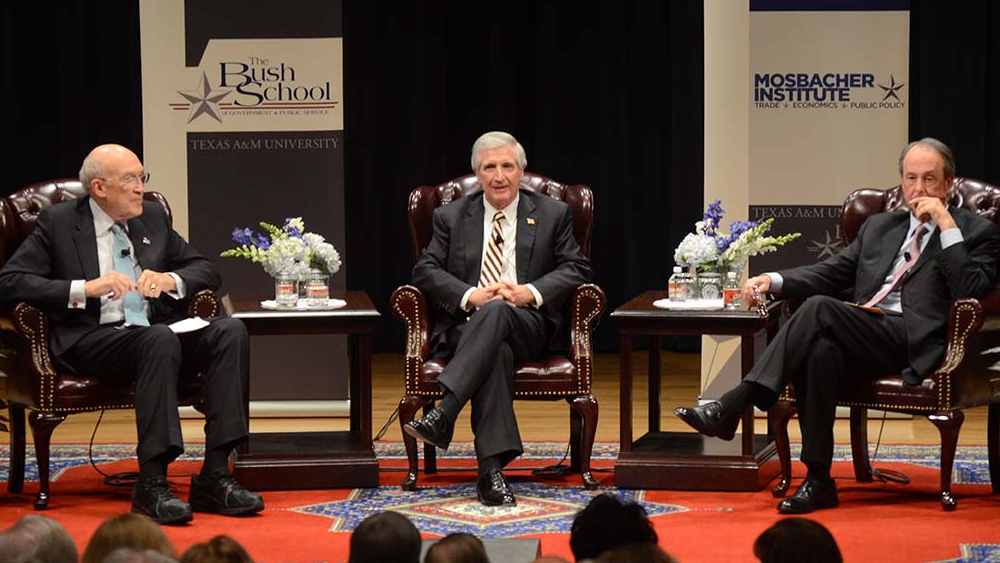
Two leading experts on the federal debt crisis spoke at the Bush School at the end of January. Alan K. Simpson, former US senator from Wyoming, and Erskine B. Bowles, White House chief of staff under President Bill Clinton, gave the ConocoPhillips White House Lecture, one of a series hosted by the Bush School’s Mosbacher Institute for Trade, Economics, and Public Policy. Some 600 students and faculty attended the event, including President and Mrs. George H.W. Bush. Following their presentation, Andy Card, former White House chief of staff for President George W. Bush, moderated a discussion and Q&A session. Earlier in the day, the two took part in a roundtable discussion with students.
Simpson and Bowles co-chaired the 2010 National Commission on Fiscal Responsibility and Reform — an innovative, bipartisan effort to solve the national debt problem. The moderated discussion highlighted why Washington failed to adopt their solution and what can be done now to fix this ever-increasing and critical national problem.
Simpson served as senator from Wyoming from 1979-1997. Known as a conservative and an opponent of government regulation, he is also recognized as an outspoken advocate of equal rights for all citizens. Bowles is a businessman and political figure from North Carolina, who served as White House chief of staff and later as president of the University of North Carolina System. Bowles and Simpson now co-lead the Fix the Debt Coalition, a grassroots campaign that mobilizes key communities to address the nation’s fiscal challenges.
During their presentation, Bowles highlighted the five key issues the nation should address if it wants to fix the debt. These issues—healthcare, national defense, reforming the tax code, ensuring Social Security’s solvency, and addressing the interest on the debt—were included in the Commission’s plan, which the President declined to adopt. Bowles noted that the US spends twice as much as any country in the world on healthcare – per capita and as a percentage of GDP—yet ranks between twenty-fifth and fiftieth on such indicators as life expectancy, infant mortality, and others. Slowing the rate of growth in healthcare spending to that of the economy is critical to our future, as is slowing spending on national defense.
“We spend more on national security than the next seventeen countries combined and are bearing a disproportionate responsibility for global world peace. Admiral Mullins got it right – our greatest national security problem is these deficits. The deficit will consume every dollar of resources we need,” Bowles said.
The other three issues were reforming the tax code, making Social Security solvent, and addressing the amount of interest the US pays on debt. Bowles noted that life expectancy averaged sixty-three years when President Franklin Roosevelt instituted Social Security; and today, it’s seventy-nine, creating an arithmetic problem. “By the end of this decade, we will be spending more than one trillion dollars on interest on the debt. That is one trillion dollars we can’t spend to educate our kids, build infrastructure, or do high-level research on our college campuses,” Bowles said.
While Simpson and Bowles are dissatisfied with the progress towards fixing this problem, they do believe there are still measures that can be taken to alleviate some of the pressure. “We can’t grow or tax our way out of this problem, nor can we cut spending enough to get ourselves out of this problem. You have to do all of it,” Bowles said. “[With this debt], we won’t be able to compete and win in a knowledge-based global economy. It’s our generation of Republicans and Democrats who created this mess, and it’s our job to clean it up.”
During the event, Simpson and Bowles received the Good Governance Award, presented by the Mosbacher Institute. “The Good Governance Award recognizes exemplary achievements in channeling high-quality policy analysis into good governance and public service,” said Dr. Lori Taylor, director of the Mosbacher Institute, “I am particularly pleased to be recognizing the service of Senator Simpson and Mr. Bowles because their work on the Commission exemplifies the spirit of public service. During a time of fiercely partisan politics, they contributed fresh thinking and independent, nonpartisan analysis to the policy debate regarding the national debt. We are honoring their service and efforts to provide nonpartisan solutions to the nation’s fiscal imbalances.”

